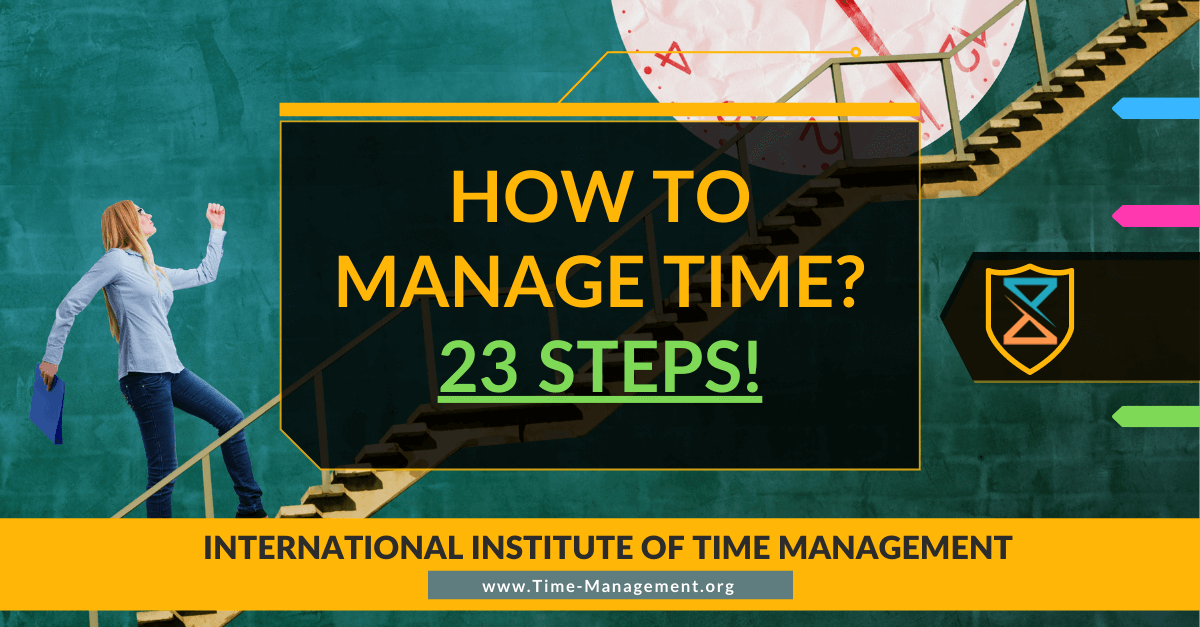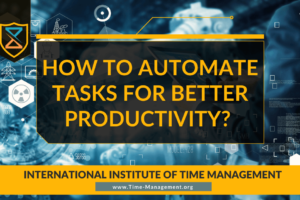

How to Manage Time? 23 Steps!
- Posted by Dr. George G. Tumanishvili
- Categories How To:
How to manage time and be more productive?
1. Build up a morning schedule
Attempt to begin your morning the same way every day. This could mean going for a short stroll to move around prior to sitting at your work area, or it could mean beginning your day by perusing a book for a proficient turn of events. Contemplation can be an incredible practice to begin your morning with. Contemplation has been shown to increase focus, work on your state of mind, and battle any pressure and uneasiness you might be feeling.
2. Keep your daily agenda short
Keep your daily agenda short and focus on three to five significant and testing assignments for the afternoon, your most significant errands that, once finished, will cause you to feel exceptionally useful. Zero in on these assignments each in turn before continuing on to less significant errands.
3. Set up an end date
Similarly, as you have a daily practice for beginning your day, you ought to likewise have a daily schedule for the end of your day, as it will situate you for an incredible beginning in the first part of the day. Start by making a rundown of the main three or five things you need to do the following day. When you’re done, fix up your work area and set aside any awkward things. You may also need to back up your PC.
4. Square off your schedule
Square off your schedule when you need to zero in on work. This will give you an opportunity to get your work done while guaranteeing your day is liberated from unexpected interruptions.
5. React rapidly!
Start reacting to individuals immediately. If you open an email that requires a response, make an effort to respond immediately so the errand is removed from your list. On the off chance that you advise somebody that you’ll hit them up about something, attempt to hit them up inside 24 hours.
6. Measure your outcomes, not your time
Keep a continuous rundown of all that you achieve during the day. This will help you feel persuaded and accomplished. This rundown makes it simple to commend your achievements and better estimate the amount of time comparable errands will require later on.
7. Improve your relational abilities
Focus on reinforcing your correspondence and coordinated effort abilities. Start by working on your undivided attention abilities and keeping focused and on-subject when you’re speaking with somebody. For instance, when you’re composing an email to an associate, keep the email short and direct.
8. Make gatherings useful
Gatherings are frequently vital, and when this is the situation, go into them with an arrangement. Have a blueprint for what you need to cover during the gathering and the ideal result. Keep the gathering as brief and useful as possible, and end it with things to do.
9. Work in 90-to 120-minute squares
Exploration has shown that your mind is best ready to center for an hour and a half at a time. Think about taking more breaks and isolating your day into an hour and a half or two-hour fragments. This will assist you with expanding your mind’s innate capacity to center and work on your general usefulness. Likewise, ensure that you cling to your break plan and stay focused on your work during your hour-and-a-half work periods.
10. Zero in on each undertaking in turn
Studies have shown that when you start with one errand then move onto the next, you really sit around as a result of the time it takes your mind to switch undertakings and change your core interest. Oppose the motivation to perform various tasks and, all things considered, center the entirety of your considerations around one undertaking until it is finished or you’re prepared to continue for the time being.
11. Set short cutoff times
Parkinson’s Law says that work expands to occupy the time accessible for its consumption. While you should consistently set sensible cutoff times for your work, think about setting more limited windows of time for finishing jobs. This strategy will regularly increase the productivity with which you’re ready to achieve them.
12. Practice pressure board methods
Practice pressures the board with methods like perusing, ruminating, paying attention to music, or rehearsing yoga. These methods can help you deal with the stress that can affect your physical, emotional, and psychological well-being and improve your workplace performance.
13. Knowing what exactly is needed is key
Having a clear picture in your mind of what you want makes it easier to achieve it. A single-minded employee with goals is always a smart working employee. At times, employees are so busy working hard that they almost forget what they are working for. A well-trained employee makes the best of his or her skills to think, analyze, and act upon actions that really matter.
14. Understanding the system perfectly
Each employee is a human working in a large social system to achieve something or other. While we work to meet our long-term goals, it is also necessary to understand the system we are working in. The sooner you understand the system, the better you will be able to produce results and cope with challenging situations. In a professional’s life, there are countless hurdles leading to failure, but wise people make the most of every high point and manipulate situations in their favor. Let’s have a look at some of the things smart workers do differently than hard-working employees. They are always looking for ways to:
- strategically implement employee management processes
- manipulate the system to their advantage.
- understand the system to achieve the goals”
15. Making the best of the right opportunities
With a positive and enthusiastic mindset, one can get through any difficult situation. But the same attitude can also lead to trouble because a positive mind tends to not leave any good opportunity that comes its way. Here, the selection of the right opportunity matters.
Rather than just going about any opportunity, one should deeply think and analyze the outcomes of every opportunity before picking it. A smart worker is a good opportunist. Be like one. For instance: if an employer offers training opportunities to its workforce, smart employees would ensure they do not leave at any cost.
16. Investing time in team planning
A smart worker is a good leader. He/She knows the art of dealing with team members and is focused on carrying out processes for goal setting, employee tracking, employee management, and 360 reviews.
For instance, if we talk about the HR industry, a smart HR person will always prefer to use online HR tools to streamline end-to-end human resource processes. Why? The answer is simple: the implementation of reliable cloud-based HR tools makes the work easier and gives smarter results.
Speaking of the HR industry, let’s not forget that most of the leading companies are using automated cloud-based performance management tools to track and evaluate employee performance in a transparent way. This is something that is called “smartest team planning” and the best utilization of time.
Wherever you go, whatever you do, always have a plan in your mind before you act. Hard workers think of escaping from reality by working hard. On the other hand, smart workers sense practical situations and implement their life’s best experiences to come out of difficult situations. Hard work alone can’t get you enough; smart work is always needed at every step to excel. We do hope you take it as your life mantra.
17. Change your disposition
Individuals with an uplifting perspective can show great drive at whatever point is required, and they find support from their associates in their work all the more easily.
A decent disposition at work and in your personal life will help you set a benchmark for your exhibition, and this shows that you can assume liability. Additionally, this will help you settle on fast choices. This tip for working smart and not in the most difficult way possible could help open doors to good freedom later on.
18. Correspondence is the key
Regardless of your job, you should work with a group to accomplish proficient objectives. You ought to work on your joint effort and relational abilities. This will help you to wipe out wastage of time and do revamps constantly. Miscommunication will cost you your job presentation as well as money for your association. You should work with your group with consistent correspondence to help team up on assignments and issues.
19. Self-preparing
Assuming you need to work more intelligently, you should set aside some effort to ask yourself what should be improved to make the most of your time. Where do you get stuck without fail? How to put it together yourself? You should take time off your schedule and have a self-meeting to prepare your plan for getting work done.
20. Focus on your errands
Here is the fundamental part, where you should forego a few undertakings that are not giving you an advantage. Do you have to ask yourself: What errands matter to you? What are your essential objectives? Are you feeling occupied? This is the place where you should focus on your day-to-day assignments and shine a spotlight on the ones that are generally significant. Work on eliminating the bottlenecks and errands that influence your work execution. Utilize the SMART objectives and OKR strategy to zero in on your everyday work.
21. First and foremost, complete the most important task
There are times when you are stacked with many undertakings. Try not to begin your day by browsing through your messages or some other least-significant undertaking. Attempt to zero in on the main assignment first to keep away from any issues with your undertaking.
If your significant assignments were done before the day was over, you would be more joyful and loose.
22. Plan ahead of time
Try not to rely on that extreme tardiness to orchestrate your plans. In the event that you see that your stocks are low, you should settle on a decision with your seller to convey the stock before you run out totally and need to confront disappointed clients.
23. Maintain support time in between errands
Try not to be in a hurry to polish off your work. When you scramble for the assignments, you will effortlessly lose concentration and influence the nature of the work. Get some downtime to have an espresso, take a deep breath, and get back to work afterward.
Looking for the Best Time Management and Productivity Growth Courses?
If you would like to learn and master your time management skills with the techniques and learn from the busiest managers in the world, the Time Management Institute offers you a special, backed by science, Time Management online training course, that will enhance your ability to plan and control your time. The online training course is developed by Professor Dr. George Tumanishvili, Founder of the International Institute of Time Management, a world-renowned scientist and coach and is based on his book Time Management That Actually Works. Life-Changing, Effective, Unique Techniques From the Busiest Managers on the Planet.
There is no time to waste!
The International Institute of Time Management offers The Most Effective Time Management Training and Time Management Online Courses in the World. Online courses and training will level up your time management, productivity, planning, and task-handling skills. Passing the online courses successfully will give you the unique knowledge of how to effectively manage your time and achieve your goals. You will also receive an international certificate issued by the International Institute of Time Management. Our certificate is already a mark of the highest quality that has been recognized by the leading companies all around the world.
The Premium Time Management and Productivity Booster Online Courses are for leaders who want to be able to effectively manage their time, plan, and achieve their goals and objectives, also for Individuals and leaders who want to learn how to prioritize and make effective, goal-oriented decisions in the shortest time possible.
Best Free Time Management Courses Online | Best Productivity Courses Online | Best Time Management Courses for CEOs | Best Time Management Courses for Managers | Best Time Management and Productivity Courses for Managers | Best Free Time Management Courses for Leaders | Time Management Skills | The Most Effective Time Management Skills | Time Management for Students | Time Management for Scientists | Time Management Certification | Time Management PDF | Time Management Techniques | Smart Habit Courses | How to Manage Time Effectively? | Most Powerful Techniques of Time Management | Time Management Matrix | Pareto | Eisenhower Matrix | ABC Analysis | Pomodoro
Tag:Automation, Best, Better, Boost, Business, CEO, certificate, Certification, Certified, Checklist, Course, Courses, Decision, Free, georgetumanishvili, Hacks, howto:, Improvement, Increase, institute, International, Learn, Management, Manager, Master, Online, Optimization, Planning, Power, Practice, Productivity, Psychology, Routine, Schedule, Skills, Step, Success, Task, Techniques, time, TimeManagementInstitute, tipsandtricks, Training, Tricks, Work
Dr. George G. Tumanishvili is one of the founders of the International Institute of Time Management and he is a leading expert and instructor.
Dr. Tumanishvili's experience is connected to providing consultations to more than 100+ companies and over 10000+ people in 25+ countries around the world.
The main scopes of the consultations are time management and productivity growth.
Full details could be found on www.tumanishvili.com/en
You can also, visit his LinkedIn profile and get connected!
You may also like


How To Create Checklists That Will Save Your Time


How to Become a Superhuman – Get Maximum from your Body and Mind?


